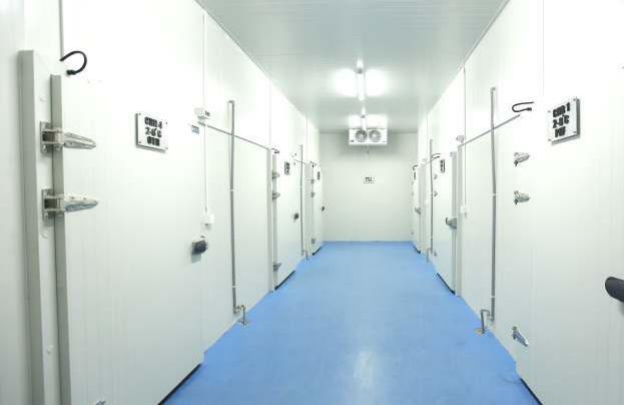AISATS Coolport: India's first integrated on-airport perishable cargo handling center
Seeing 100 percent import cargo volumes increase and receiving shipments from 1,000-odd trucks from other cities in India, the Kempegowda International Airport is also expanding its logistics facilities, setting up a 5-acre truck parking area with amenities for food & beverage outlets, service and fuel stations.
The Kempegowda International Airport in Bengaluru, owned and operated by Bengaluru International Airport Limited (BIAL), is among the world’s fastest growing airports with state-of-the-art facilities for both passengers and cargo.
And it is not stopping at that. The airport has undertaken a massive Rs. 13,000 crore (about US$1.864 billion) capacity expansion to cater to the long-term demands of the growing aviation market in India.
Its growth has been stupendous. By the end of financial year 2018-2019, the airport registered a record 33.30 million passengers. It undoubtedly plays a key role in driving the economy of the region – offering a wide air-route network – with over 37 passenger airlines and 15 cargo airlines operating from its zone.
Its cargo throughput saw a sharp increase of 11 percent, handling 386,780 metric tons (MT), including 242,650 MT international cargo. Cargo volumes were up from 348,403 MT in 2017-18. Air traffic movements (ATMs) increased by 21.8 percent with a total of 240,251 landing and take-offs, with the average ATMs per day for the year being 658. Airport authorities are constantly working on various projects to keep on benchmarking the facilities.
AISATS Coolport
One such is the AISATS Coolport (Air India and SATS Limited joint venture) which has come as a boon to exporters and importers of pharma, perishables and other temperature-sensitive items.
Thanks to the state-of-the-art facilities it offers, the catchment region is fast expanding. There is considerable movement of perishables from not just the catchment radius of 250 km, but beyond.
There are some exporters from Vishakapatnam, Hyderabad, etc., which are often trucking it to AISATS Coolport and to destinations beyond. It has the largest air cargo terminal handling capacity in South India and the average distance by road is 9 hours from manufacturing clusters.
AISATS, which started comprehensive ground and cargo handling services here in 2008, has been growing from strength to strength.
In order to cater to the burgeoning demand for perishable cargo, AISATS launched the ‘Coolport’— India’s first integrated on-airport perishable cargo handling center.
AISATS Coolport is a one-stop shop comprising regulatory offices such as Customs Clearances; State-of-the-art Drug Controller laboratory; Plant quarantine inspection and certification office. Earlier, exporters and importers had to shuttle between the city and the airport to get clearances, now all that happens within the airport, thus, truly facilitating ‘ease of business’.
Thanks to its facilities, AISATS Coolport has already notched up substantial business and has capacities for more. In 2018-19, it had handled around 23,000 tons of cargo, compared to 17,000 tons the previous year, registering overall year-on-year growth rate of 35 %.
The growth has been across all types of cargo – perishable moved from 12,000 tons to 17,000 tons (42 % growth); pharma up from 3,000 tons to 3,550 tons (18% growth); cut flowers 1,500 tons to 2,000 tons (33%).
During Valentine season in February this year, the facility alone handled 180 tons of flowers, mostly to Europe. Last summer, it exported 195 tons of mangoes. The other special products it has handled include – 700 tons of hatching eggs; 30 tons of food items such as Oreo biscuits, chocolates, paneer, etc.
Imports include over 30 tons of Atlantic Salmon which is finding its way into speciality restaurants in the city. Similarly, it has been handling Special Mochiice – creams from Thailand.
“This essentially means that the required temperature for certain pharmaceutical vaccines and medicines is maintained not only in storage, but also in the pre-loading area, right up to the time the cargo is loaded onto the aircraft. Of late, we have had exporters from the pharmaceutical industry in Goa and Vishakapatnam use our facilities, besides several other places from South India. We are seeing a growth on the biotech front. Though the volumes are small, that segment is seeing a steady growth rate,” he added.
The airport’s Drug Controller lab incidentally is only the second and the largest such facility in India. Testing of all export and import of pharmaceuticals that is required by Customs is done at the airport itself.
The top 12 countries where Indian pharmaceuticals are exported to the tune of 70 % are USA; UK; Australia; Canada; France; Vietnam; Philippines; Germany; Nigeria; Algeria; Uganda; and Russia.
World-class air cargo solutions
With such facilities and benchmarking, the Kempegowda International Airport is providing consistent and reliable world-class air cargo solutions with focus on the needs of customers.
It has one of the most mechanized cargo terminals in the country, which includes automated storage & retrieval system (ASRS); elevated transfer vehicle (ETV); very narrow aisle trucks (VNA); high rise racking; lift and run system (ULD movement); reach stackers with bar code readers, and handheld devices.
Realising the importance of trade in the region, the airport is connected to 79 destinations (50 domestic an 29 international). The 15 dedicated freighters— AeroLogic, Cathay Pacific, Etihad, Ethiopian, Fedex, Uni-top, Lufthansa, MAS Cargo, Qatar Cargo, Singapore Airlines, DHL, Turkish Emirates, Blue Dart, and SpiceXpress have been doing substantial business from here.
AISATS Coolport features include:
- 11,000 sqm facility
- Handling capacity – 40,000 metric tons
- Major perishables (fruits, vegetables, cut flowers, seafood, meat, dairy products)
- Pharmaceuticals
- Acceptance, Handling & Delivery at ambient temperature of 20 to 25 deg C
- 11 dedicated cold rooms with temperature ranging from 2 to 8 deg C
- 5 dedicated freezer rooms with temperature ranging -15 to -25 deg C
- Refrigerated queue lane with temp range of 2 to 8 deg C for ULD storage
- Indigenous developed cool trolleys
- Separate X-ray machines for pharma and perishables
The BIAL, along with its cargo custodians Air India SATS Airport Services Private Limited (AISATS) and Menzies Aviation Bobba Bangalore Private Limited (MABB), has capacity of handling 70,000 MT annual perishable cargo. Menzies Aviation Bobba Bangalore Pvt. Ltd also has a cold zone.
Pharma Exports on the rise Pharma exports accounts for more than 7% of total exports from here of which 2% is temperature controlled pharmaceutical. They have been growing at a steady growth of 25%.
“From an IATA perspective, cold chain pharma is expected to be worth around $415 billion annually. According to them, 20% to 25% of products shipped are degraded due to incorrect shipping process and flawed cold chain. The biggest value-add we provide our customers at Kempegowda International Airport, Bengaluru is that there is no temperature deviation in our coolport facility,” Satyaki Raghunath, Chief Strategy and Development Officer, Bangalore International Airport Limited, told Air Cargo Update.
“This essentially means that the required temperature for certain pharmaceutical vaccines and medicines is maintained not only in storage, but also in the pre-loading area, right up to the time the cargo is loaded onto the aircraft. Of late, we have had exporters from the pharmaceutical industry in Goa and Vishakapatnam use our facilities, besides several other places from South India. We are seeing a growth on the biotech front. Though the volumes are small, that segment is seeing a steady growth rate,” he added.
The airport’s Drug Controller lab incidentally is only the second and the largest such facility in India. Testing of all export and import of pharmaceuticals that is required by Customs is done at the airport itself.
The top 12 countries where Indian pharmaceuticals are exported to the tune of 70 % are USA; UK; Australia; Canada; France; Vietnam; Philippines; Germany; Nigeria; Algeria; Uganda; and Russia.
 “We are the first airport in South India to house a fully operational Drug Control Lab, which incidentally is only the second and the largest such facility in the Country. Testing of all export &import of pharma-ceuticals that is required by customs, is therefore done at the Cargo Terminal itself. In addition, the Coolport has also been awarded the Group Distribution Practices Certification for WHO-mandated standards,” Raghunath explained.
“We are the first airport in South India to house a fully operational Drug Control Lab, which incidentally is only the second and the largest such facility in the Country. Testing of all export &import of pharma-ceuticals that is required by customs, is therefore done at the Cargo Terminal itself. In addition, the Coolport has also been awarded the Group Distribution Practices Certification for WHO-mandated standards,” Raghunath explained.
“Our Drug Control Lab is now fully operational and our clients need not go to a city laboratory for the testing required by customs. This has enabled shippers considerable savings in transportation cost and time. Historically, raw material used to be imported to Mumbai and then ferried by road to Bengaluru. We are witnessing a 100 percent growth in import volumes with cargo now being sent directly to Bengaluru as it saves importers a huge amount of transaction cost,” he noted.
BIAL’s vision
BIAL’s vision is to make the airport a successful passenger and cargo hub with state-of-the-art infrastructure and technological advancements that deliver efficient airport operations.
To boost the cargo movement, BIAL has strengthened the connectivity to catchme t areas, with the introduction of a dedicated road feeder service – under the brand name LOGI Connect connecting Tirupur, Coimbatore and Ambur to the airport. All this has given an upper – edge in establishing Bengaluru as a cargo hub for South India. The airport aims to be hub for cargo traffic and shippers aspiring to reach this fast-growing region.
BIAL is in the process of setting up a 5-acre truck parking facility spread. It will have amenities like food & beverage outlets, service and fuel stations. On average, the airport receives shipments from 1,000-odd trucks, including from other cities like Hyderabad, Tirpur & Visakhapatnam.
BIAL has invested substantially to develop a world – class cargo infrastructure with state-of-the-art Cargo terminals for faster turnaround. The current design capacity of the combined cargo terminals is 5,70,000 MT, catering to both international & domestic traffic. There is scope to further expand capacity up to 8,50,000 metric tons.
Currently, Air India SATS Airport Services and Menzies Aviation Bobba are the two cargo terminal operators. The master plan of the airport has incorporated additional space for the development and building of an integrated air cargo and logistics hub in future.















